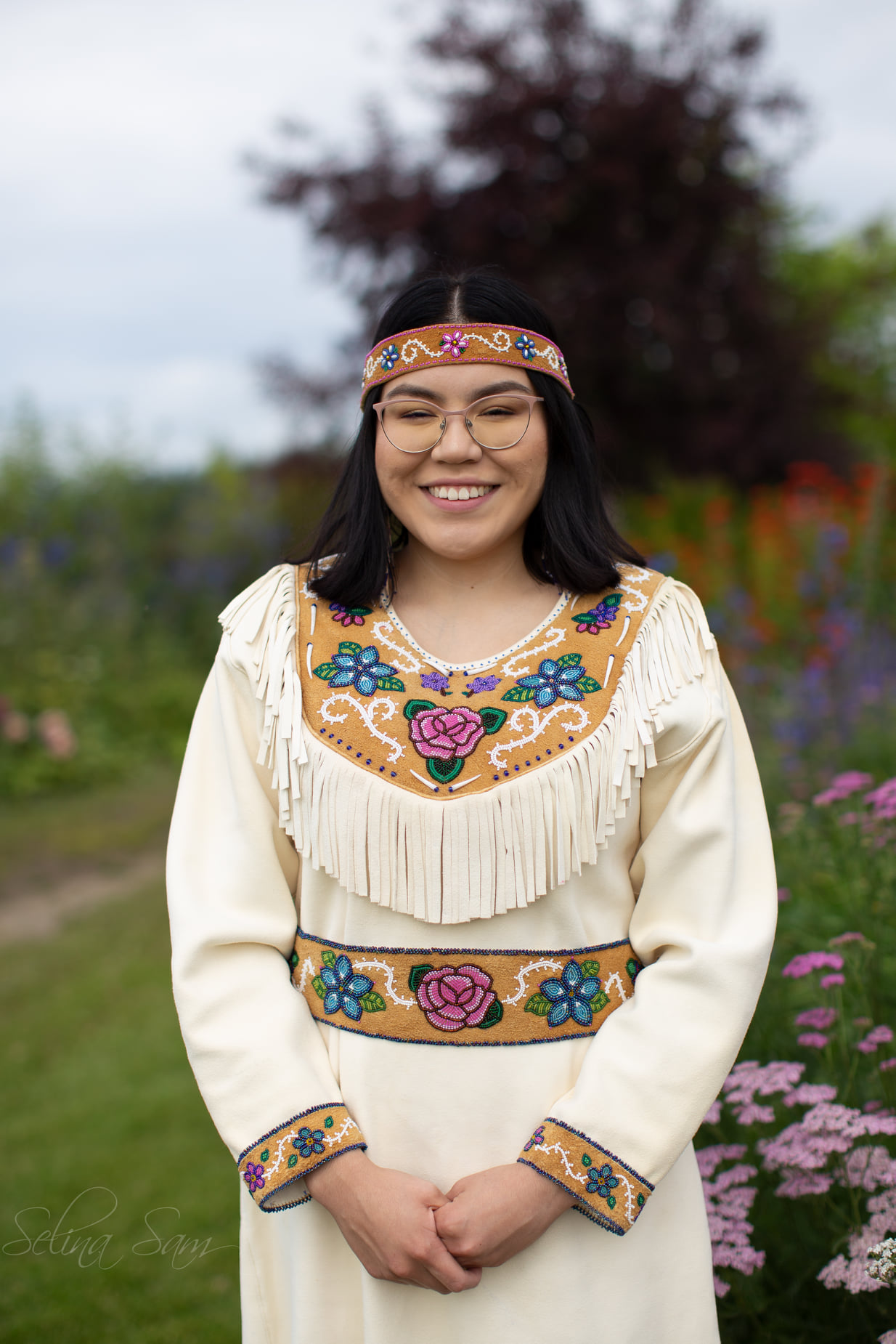BLaST celebrates November Scientist of the Month

Since 2016, the Biomedical Learning and Student Training (BLaST) program at UAF has highlighted scientists from all biomedical fields through its Scientist of the Month articles. BLaST Scholar and °®ÎÛŽ«Ãœ biology undergraduate student Laura Ekada was selected as the November 2022 BLaST Scientist of the Month.
Laura Ekada, a third-year BLaST Scholar, is Athabascan and her family is from Minto, Nulato, and Koyukuk, Alaska. Ekada attended Umpqua Community College in Roseburg, Oregon for two years where she ran cross country and track and wrestled before coming to °®ÎÛŽ«Ãœ. She is pursuing her Bachelor of Science degree in biology with a concentration in biomedicine and will graduate in December 2022. She plans to attend medical school in hopes of becoming a doctor and serve Alaska Native people in the interior of Alaska. She is interested in Indigenous culture and how it influences well-being.
Ekadaâs research includes qualitative projects looking at cultural strengths and resilience of Alaska Native populations in relation to Athabascan values. Janessa Newman, a former BLaST Scholar who is also Athabascan, added, âLaura and her Alaska Native background and upbringing in her culture and having lived in rural Alaska, brought unique perspectives to the research team that helped define better themes and issues that are important to Alaska Native research.â
One BLaST research project is looking at questions on how culture and traditional activities could mitigate negative impacts of the pandemic, isolation, and their effects on mental health. Another project (funded by the American Indian/Alaska Native Clinical and Translational Research Program) examines how intergenerational connections, reflections on strengths, and digital storytelling facilitates cultural connections and wellness for rural Alaska Native youth. Both highlight how cultural activities support well-being and helped Ekada learn how to conduct interviews and focus groups with Native populations, something that takes strong communication and facilitation skills.
She shared her experience to the Plants for Human Health Institute in North Carolina, âI was introduced to a facility where I got to see science in action, making it feel more plausible for me. I can see myself here.â
Ekada recently sat on the 2022 White House Native Womenâs Symposium virtual panel on mental health, a national symposium organized by the White House Office of Intergovernmental Affairs. She also presented her research at the 2021 National Institutes of Health Diversity Program Consortium Virtual Research Symposium and at the 2021 John Hopkins School of Medicine Virtual C.A.R.E.S. Symposium as part of an internship as a MCHC/RISE-UP scholar. She plans to present at the upcoming Annual Biomedical Research Conference for Minoritized Scientists from Nov. 9-12 in Anaheim, California.
Ekada credits her mentors for teaching her valuable research skills such as qualitative analysis, research design, and writing research articles under the guidance of her mentors, faculty research professor and BLaST faculty pilot project awardee Dr. Jacques Philip of the Center for Alaska Native Health Research center, Dr. Inna Rivkin, an associate professor of psychology, Janessa Newman, an Interdisciplinary masterâs student and former BLaST Scholar (2018-2019), Cathy Brooks, an associate professor in the Department of Alaska Native Studies and Rural Development, and her BLaST Research, Advising and Mentoring Professional Emily Sousa.
Philip shared, âIt has been a blast to work with Laura on our research projects. Laura used her unique Indigenous perspective to draw a scene that we included in a journal manuscript, visually illustrating how nature, animals and culture may contribute to well-being in Alaska rural communities.â
Rivkin also shared, âItâs wonderful to see Laura inspire and engage with youth, integrate art with science, and collaborate across disciplines and communities.â
Ekada also shares her leadership by hosting âThe Urban Auntie Show,â a student radio show which highlights Indigenous history, current events, and issues important to many Alaska Native people through podcasts, music, and newscasts. She is also a °®ÎÛŽ«Ãœ student assistant peer educator at the Nanook Diversity and Action Center, helping plan many °®ÎÛŽ«Ãœ student events.
These BLaST Scientist of the Month articles are shared across all °®ÎÛŽ«Ãœ and University of Alaska Southeast rural campuses and with BLaSTâs partners IÄŒisaÄ¡vik College, Fort Lewis College, Diné College, Salish Kootenai College and Alaska Pacific University. For more BLaST Scientist of the Month highlights, visit .
The Biomedical Learning and Student Training (BLaST) program is a NIH-funded °®ÎÛŽ«Ãœ program that enhances capacity for undergraduate biomedical research training and efficacy for engaging students from diverse, especially rural Alaskan, backgrounds in education and training for biomedical research careers. BLaST started in 2014 and continues to provide research opportunities for faculty, staff and students through its many workshops, curriculum, and research support and is in its second five-year phase II program.
Any questions about this article or any BLaST publications, please contact Amy Topkok.


